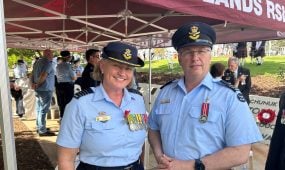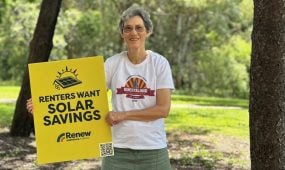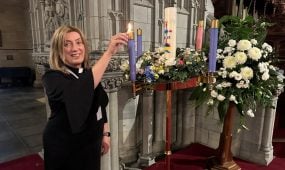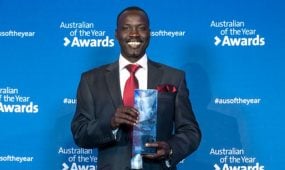Q&A with Army chaplain, Archdeacon, Brigadier and parish priest, The Ven Rob Sutherland CSC
Spotlight Q&A
Meet Rob Sutherland and find out about what Remembrance Day means to him, the projects he is working on, what he would write on a billboard, his secret skill and suggestions he has for commemorating Defence Sunday
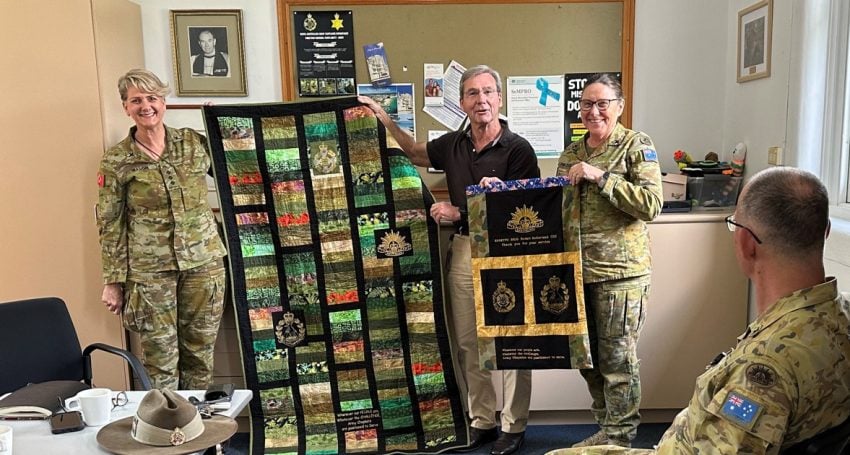
Where do you currently live and where do you worship?
Penny, my wife, and I live in Kenmore, which isn’t where we were originally looking to live, but it’s really nice and we worship in the neighbouring parish at St Michael’s, Moggill, where I have been the locum Priest-in-Charge for two years.
How long have you been involved in the Anglican Church and in what roles?
I was born and baptised in South Australia into what was then called the Church of England and have been a part of the Church in Australia and around the world for as long as I can remember. I started being part of Sunday School and youth group and worked up to being ordained and serving as an Army chaplain and parish leader.
What do your main current roles involve?
I am in the last two months of being an Army chaplain. My final task has been running a pilot program re-introducing chaplaincy into the Department of Veterans’ Affairs (DVA). As a chaplain, I have been overseas on operational deployments, doing direct ministry with soldiers, seven times.
As a locum part-time Priest-in-Charge at a small Anglican parish, I lead Sunday worship, including children’s activities; lead Wednesday Morning Prayer and Bible discussion; pastorally and spiritually care for parishioners and their families; fulfill Diocesan compliance requirements; and, when there is time, undertake wider community engagement.
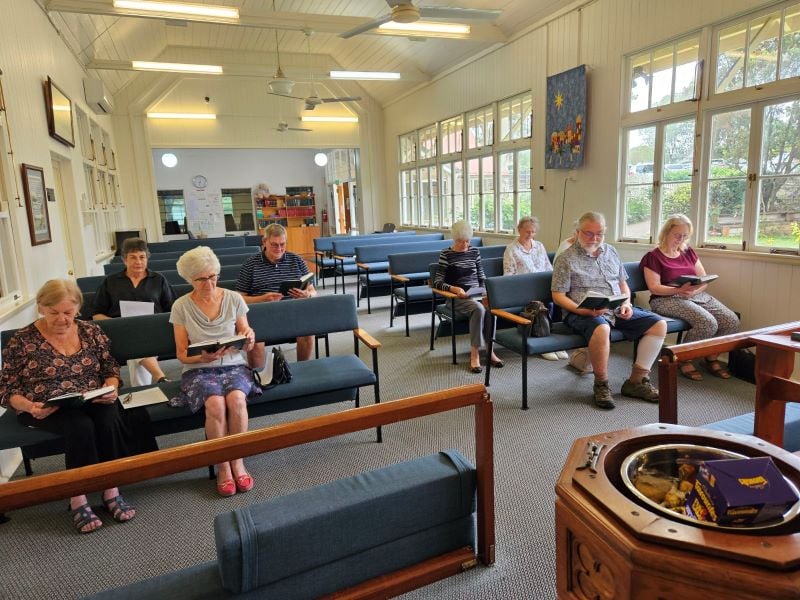
St Michael’s, Moggill community members gathering for Morning Prayer and Bible discussion in October 2024
How, when and why did you become an Army chaplain?
After serving as an Army officer for 20 years I heard God’s call to change direction, to become an Army chaplain. A Vietnam veteran Army chaplain, Les Thompson, tapped me on the shoulder one day in 1990 and said, “It’s now time to become a chaplain.” That year Les tapped three of us from 6th Battalion, Royal Australian Regiment (6RAR) on the shoulder — Ken Hopper, Ben Hall and me — and after study and ordination, we all became Army chaplains.
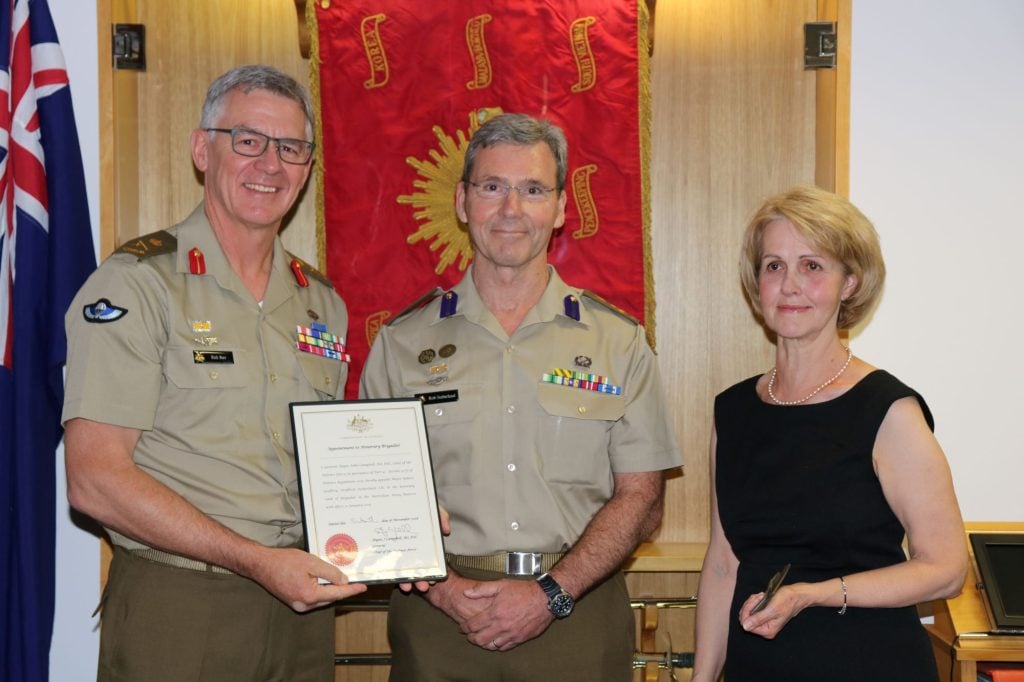
Lieutenant General Chief of Army Rick Burr AO, DSC, MVO promoting Rob Sutherland to Brigadier from Major in 2018, with the support of Penny, Rob’s wife
What do you enjoy most about being an Army chaplain?
The ability to bring God’s love and presence and hope to soldiers wherever they are. I love seeing God at work.
What has been one of the single key memories of your time in your Army chaplaincy role?
There are many highlights — each place God has put me has been important. Being chaplain to a Special Operations task group in Afghanistan is something I will always cherish — each time we were there we all felt like we were “walking through the valley of shadow of death”. I realised my whole military career, perhaps my whole life, prepared me to be God’s minister in every situation.
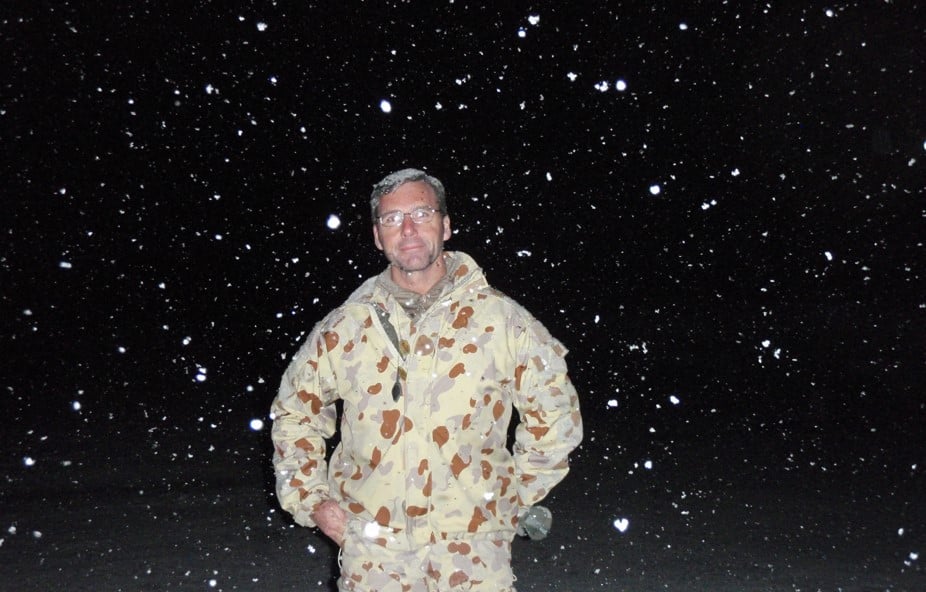
Army chaplain Rob Sutherland in Afghanistan in 2008
What projects or activities are you currently working on in your role?
I am working on the Veterans’ Chaplaincy Pilot Program, which looks at how chaplaincy can and should be re-integrated into the Department of Veterans’ Affairs. I am also running Warrior Welcome Home, which is a Christian, faith-based, moral injury recovery program for veterans and their families.
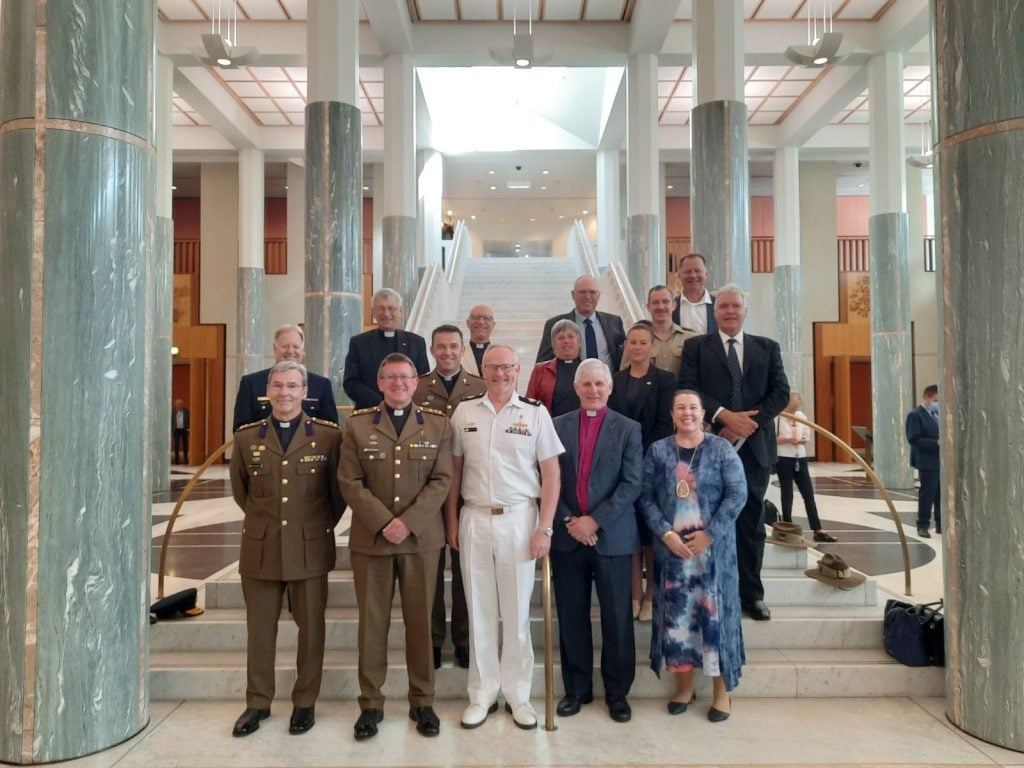
Chaplains and Warrior Welcome Home participants at the Parliamentary Prayer Breakfast in Canberra at Australian Parliament House in 2022
What do current and former Australian Defence Force personnel look for in a faith community?
Soldiers and their families look for integrity, genuine-ness and relevance to them — they want to be part of a community and ministry that understands them and their families and their situation. They want understanding, acceptance, love and hope.
What does Remembrance Day mean to you?
Anzac Day is about remembering what happened in war — being grateful for those who are prepared to serve and when necessary, fight for us. Remembrance Day is about recognising the cost that this has for those who serve and their families and it is about bringing veterans home — it is about healing and re-integration of Defence members and their families back into our community.
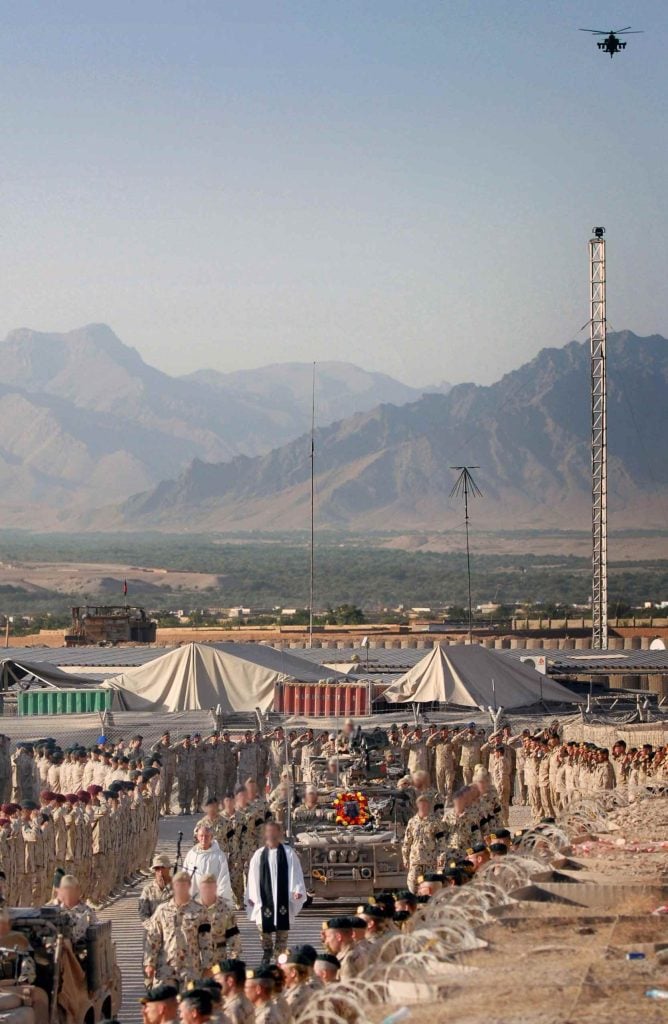
A funeral procession (ramp ceremony) for an SAS signaller in Afghanistan in 2008
Why is it important for parishes and ministries to commemorate Defence Sunday annually?
Commemorating Defence Sunday allows us, as the people of God, to connect with our veterans and families and shows that God and we within the Church care about the human and spiritual costs of war and Defence service. It also connects us with currently serving people and the chaplains who minister to them. It shows that we care for and value them.
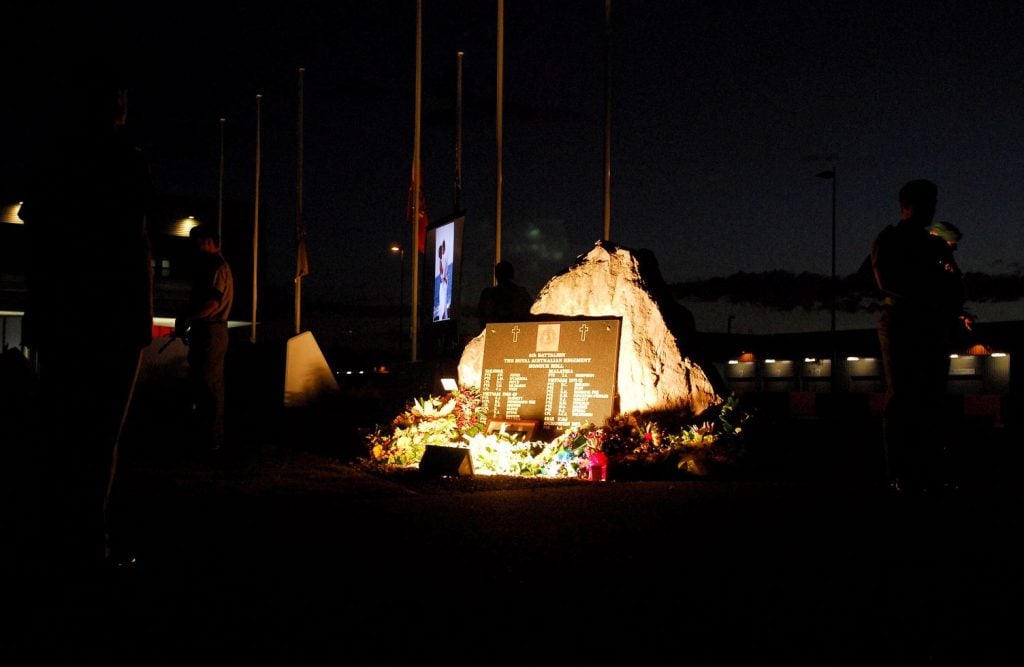
Memorial service for Lance Corporal Jason Marks at the Commando Memorial in Holsworthy, Sydney in 2008 — he was killed in Afghanistan
How can parishes and ministries commemorate Remembrance Day on 11 November and Defence Sunday on 10 November this year?
Churches can do almost anything that is meaningful and authentic as a commemoration — simple or formal, big or small. Last year our children’s group made a cardboard wreath with poppies and placed it in front of the altar. We also played “The Last Post” on Spotify. We’ve previously had “The Last Post” played on saxophone and on the organ and sang the Australian National Anthem.
I prefer rosemary (which is very Aussie) over poppies (which is very European), so I often have a basket of fresh rosemary for people to place in an offertory basket, which is carried forward, as our offering.
Inviting veterans or families to wear medals and asking them to name and share about the family member who is being remembered allows connection.
The Anglican Bishop to the Australian Defence Force, Grant Dibden, and Defence Anglicans have some good material that Archbishop Jeremy has distributed to all parishes, including a short YouTube video and liturgical resources.
I like to keep it simple (which is authentically Australian) and consistent with who the parish is.
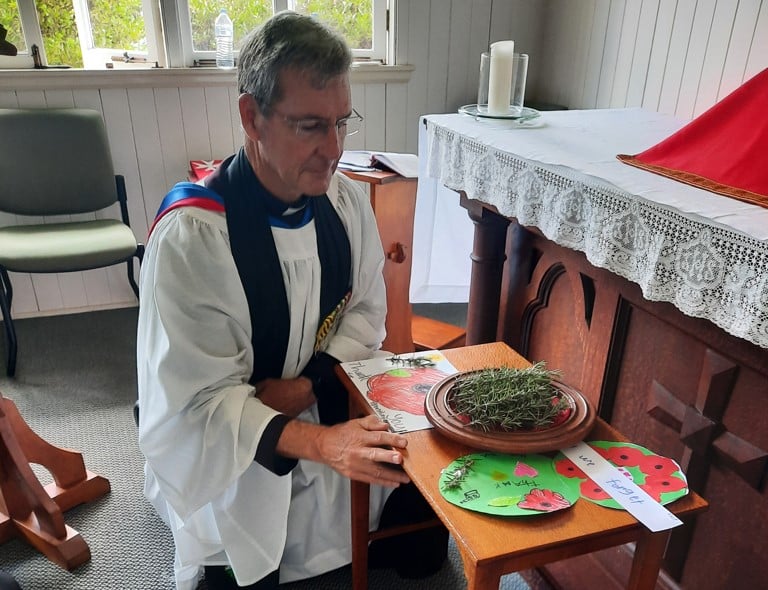
The Ven. Rob Sutherland CSC commemorating Remembrance Day with rosemary and poppy wreaths in 2023 at St Michael’s, Moggill
Can you tell us a little about your Christian faith journey?
I can’t remember a time in my life when I haven’t been a Christian. My journey has had many changes. But God’s call to me has always been the same as it was to Jesus’ disciples — “follow me”. As I have done that, wherever it has taken me and whatever has happened, God has looked after the rest. God has empowered this and delivered the results when and where God has wanted.
How does your Christian faith inspire you and shape your outlook, life choices and character?
For me, God has the plan and it’s my task to follow this no matter where and what. I think Psalm 23 describes my journey best — God is my shepherd, and life works best when I let God lead. You know the joke — “How do you make God laugh? Tell God your plans.”
What is the primary strength of the Church and what is the best way to make the most of these for the benefit of our communities?
The primary strength of the Church is the presence of God. We are called to be the Body of Christ, and this means we sometimes need to stop being so busy doing and go back to being. Perhaps we need to stop being the busy Martha and remember Jesus commending Mary for listening to God.
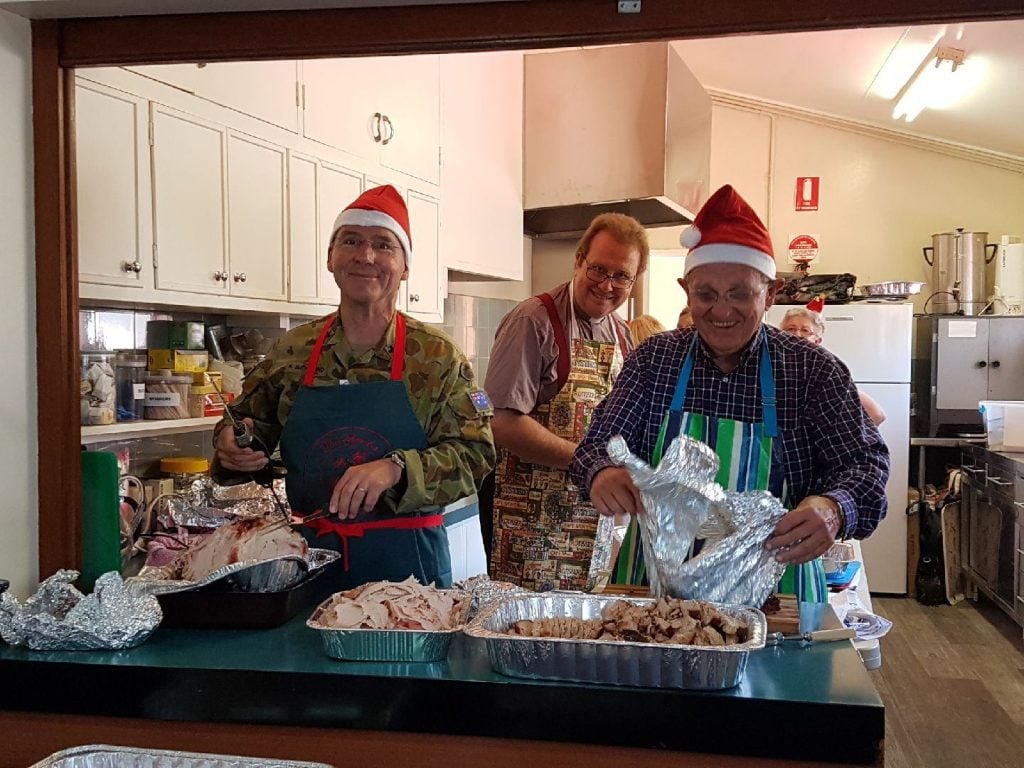
The Ven. Rob Sutherland CSC and parishioners carving for the 2018 community Christmas lunch in Sydney at St John’s, Gordon
What is your favourite Bible scripture and why?
John 14.1-7 because when Jesus is being theological Thomas dares to ask the questions that we all long to ask: “Lord, we do not know where you are going. How can we know the way?” For Australian soldiers, when their officers come up with a plan that they don’t understand, they are pretty quick to say so. A Digger would say to Jesus, “Hey Skip, we have no **** idea where you are going, how on Earth can we know the way?” We don’t need to understand all of the detail of heaven, but when Thomas asks, Jesus says that all we need to do is to follow him.
What person of faith inspires you the most and why?
St Thomas inspires me because when he didn’t understand, he had the courage, he dared to ask Jesus. And, Jesus often gave some of the best answers when people dared to ask their honest questions. Thomas gets a bad rap — he is often called “Doubting Thomas”. I call him “Honest Thomas”.
What is the best piece of advice you have ever received and who gave you this advice?
“Let go and let God”, but I can’t remember who gave me that advice.
What advice do you have for those who might want to follow your example?
Don’t even try to follow me — just listen to and follow Jesus.
What do you do in your free time to recharge and relax?
I spend time with my grandchildren doing whatever they want to do, such as playing tag and reading a book of mum jokes — I’m great at building towers.
If you found yourself on a deserted island, what three things would you choose to have with you?
A Bible, insect repellent and something to play music.
If you could have a billboard with any text on it, what would it say and why?
“For God so loved the world that he gave his only Son, so that everyone who believes in him may not perish but may have eternal life” (John 3.16) because Jesus is all about life.
What book have you given away most as a gift and why?
Moral Injury: Unseen Wounds in an Age of Barbarism, which was edited by Prof Tom Frame, because it explains the predicament of veterans from lots of different perspectives. It has chapters by military historians, former soldiers, chaplains (including a chapter written by me) and psychologists.
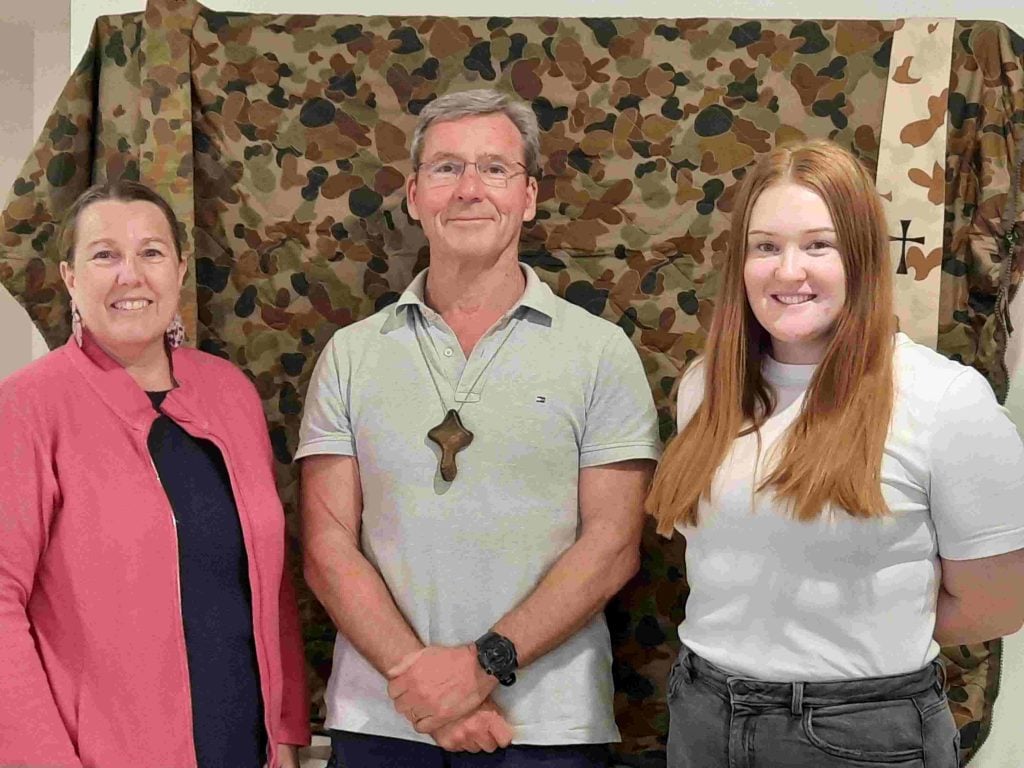
ADF chaplain The Ven. Rob Sutherland CSC, with Mrs Fran Tilden and Pastor Rebecca Hopfner, at a Warrior Welcome Home Program gathering on 13 September 2023 in Coolangatta
Where do you do your best thinking?
Sitting outside with a cup of coffee (or maybe a glass of South Australian red wine).
If you are having a bad day, what do you do to cheer yourself up?
I sit beside my pool or by the river or on the beach with my feet in the water, probably salt water in my hair and hopefully a cup of coffee in my hands.
What is your secret skill?
Making children laugh.
If you could only eat one thing for the rest of your life, what would that be?
Sparkling water.
What item should you throw out, but can’t bear to part with?
All my old Army stuff — I have bits of uniform from 50 years ago.
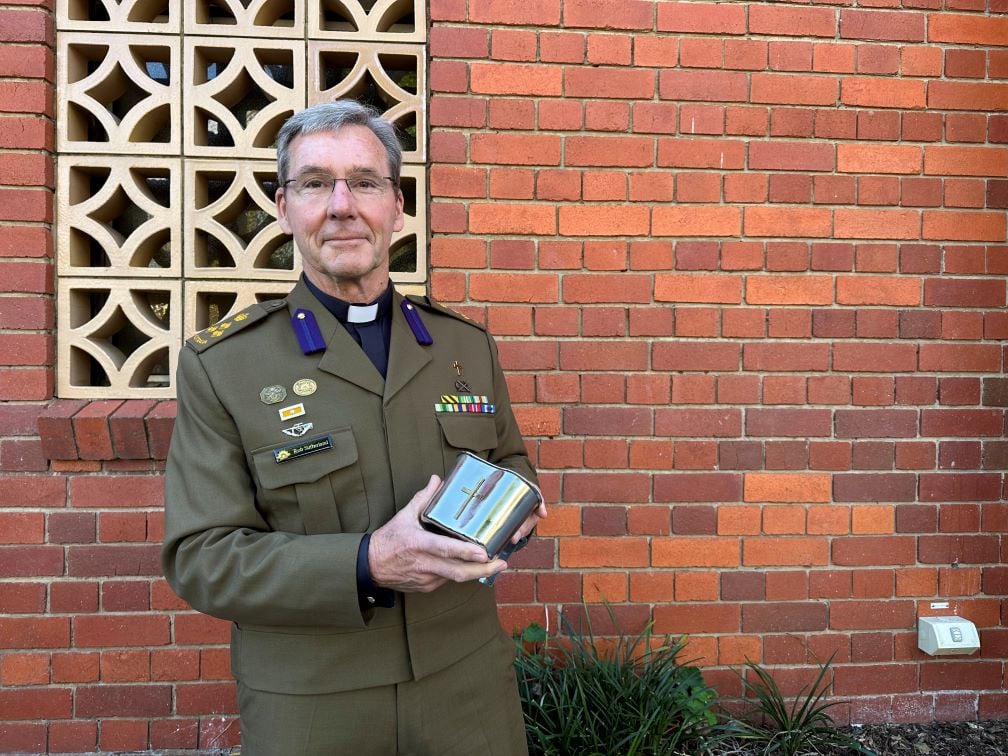
The Ven. Rob Sutherland CSC holding a chalice at Diocesan Synod in June 2024. The “chalice” is made from an Army cup’s canteen, which soldiers cook in, eat from, make coffee in and drink from, and even shave from, while bush patrolling on foot. The guys in the workshop in Tarin Kowt, Afghanistan made it for Rob
What do you want to do next?
Whatever God has planned for me to do.
What’s your unanswerable question — the question you are always asking yourself?
Why?

